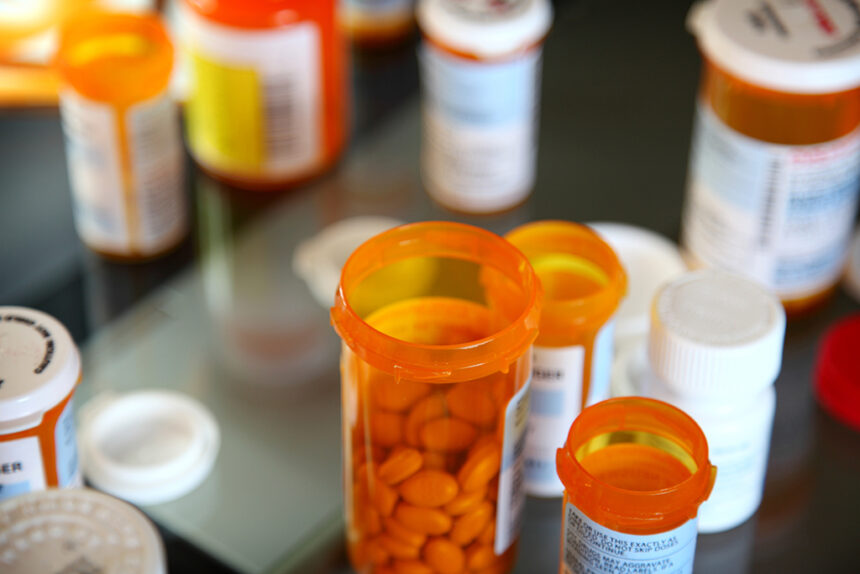The Biden administration announced the first 10 prescription drugs that have been selected for Medicare price negotiations Monday morning.
The list released by the Department of Health and Human Services (HHS) includes several well-known drugs like Pfizer and Bristol Myers Squibb’s Eliquis, Eli Lilly and Boehringer Ingelheim’s Jardiance as well as AstraZeneca’s Farxiga.
According to Medicare Part D spending data from 2021 released by the Centers for Medicare and Medicaid Services (CMS), the federal healthcare program spent $12.8 billion on Eliquis during that period.
The other seven drugs on the list include Johnson & Johnson’s Xarelto and Stelara, Novartis’ Entresto, AbbVie’s Imbruvica, Merck’s Januvia, Amgen’s Enbrel and Novo Nordisk’s insulin injections like Fiasp and NovoLog.
The widely expected announcement marks the latest and most significant implementation of provisions from the Inflation Reduction Act, which was passed last summer. The landmark bill included major drug pricing policies, such as allowing Medicare to start negotiating prices this year for select prescription drugs and having those prices effective starting in 2026.
“For far too long, pharmaceutical companies have made record profits while American families were saddled with record prices and unable to afford life-saving prescription drugs. But thanks to the landmark Inflation Reduction Act, we are closer to reaching President Biden’s goal of increasing availability and lowering prescription drug costs for all Americans,” HHS Secretary Xavier Becerra stated. “Although drug companies are attempting to block Medicare from being able to negotiate for better drug prices, we will not be deterred. The Biden-Harris Administration will continue working to ensure that Americans with Medicare have access to innovative, life-saving treatments at lower costs.”
“Today marks a significant and historic moment for the Medicare program with the announcement of the first drugs selected for Medicare drug price negotiation,” CMS Administrator Chiquita Brooks-LaSure said in a statement. “Our goal with these negotiations is to improve access to some of the costliest drugs for millions of people with Medicare while driving competition and innovation.”
While the Biden administration, congressional Democrats and several healthcare advocacy groups have applauded the listing of the first 10 drugs and a more aggressive approach to drug pricing, more than half a dozen drugmakers and the industry’s lead lobbying group have already challenged the law in court.
Shortly after the list was released, Pharmaceutical Research and Manufacturers of America (PhRMA) CEO Stephen J. Ubl called the announcement “the result of a rushed process focused on short term political gain rather than what is best for patients.”
Ubl said most of drugs selected for negotiation already have “significant rebates and discounts” due to private sector negotiation that occurs through the Medicare Part D program. He added that PhRMA believes giving one government agency power to “arbitrarily set the price of medicines” with little accountability or oversight will have negative consequences down the line.
“Politics should not dictate which treatments and cures are worth developing and who should get access to them. The cancer moonshot will not succeed if this administration continues to dismantle the innovation rocket we need to get there,” Ubl stated. “The harm will spread beyond cancer and impact people with rare diseases, mental health illnesses and other terrible diseases.”
Additionally, Gunnar Esiason, a leading patient advocate for cystic fibrosis care and son of former NFL quarterback Boomer Esiason, derided the announcement as a influenced by political calculations rather than healthcare data.
“Political motivations win again. Easier for politicians to take on an industry that’s misunderstood and hated instead of the real cost drivers in their own congressional districts (hospitals),” he tweeted.
While the Biden administration’s announcement is major first step in its efforts to rein in high drug prices, there is plenty of room for interpretation about what this cohort of medicines means for the industry as a whole.
Daniel Chancellor, a biopharma consultant, tweeted that it it looks like CMS is “not in the business of predicting when generics/biosimilars will be available, despite it being a key criteria for eligibility.”
Notably, the list does not include Astellas’ Myrbetriq, which ranked higher than Enbrel on the 2021 CMS spend data, or Novo’s popular diabetes drug Ozempic, noted Evercore ISI in an analyst note. One reason Ozempic may not have made the initial list since it was approved in December 2017 and has patent protection until December of next year.
Looking ahead, the next list will include 15 additional prescription drugs and be released on February 1, 2025, which the Evercore noted could mean that Ozempic makes the cut then.
The analyst note also stated that the inclusion of Januvia and Stelara were confusing choices since neither drug would be a “single source” at the point price negotiation goes into effect in 2026 and could face generic competition in that time.
Senior Biden administration officials told Endpoints News that some of the drugs, like Stelara and Fiasp, may fall off the list if generic or biosimilar competition comes to market before 2026.
Similarly, a J.P. Morgan analyst note stated that while the inclusion of Stelara was somewhat unexpected, the listed drugs are “relatively small revenue/EPS contributors to their respective” drugmakers and do not have any meaningful impact to estimates.
J.P. Morgan said it will follow updates on the level of price cuts as well as statements from the affected pharma companies prior to the publication of the final prices on Sept. 1, 2024.
“And more broadly on the IRA, we continue to see a fairly limited impact to our Diversified BioPharma group (low- to mid-single-digit EPS impact) and believe innovation/the sector’s ongoing pipeline progression will ultimately represent a far more important driver to stock performance,” the note stated.
This story has been updated with additional commentary.
For a January 2024 article on Big Pharma drug price hikes, click here.








